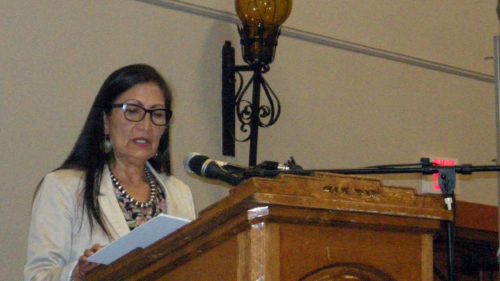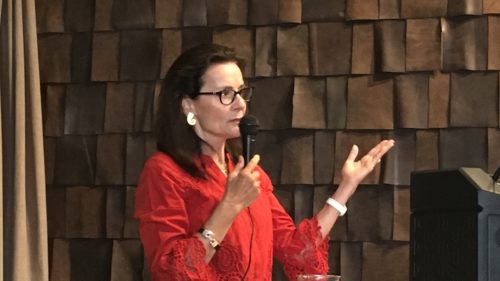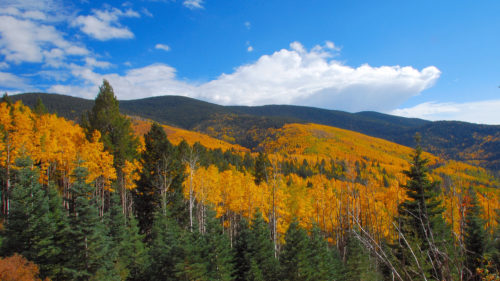There is an extraordinary place in the Carson National Forest near my home in Taos that I, and those who hunt with me long ago named “The Church.” It is an expansive, hundred plus year old aspen grove that sweeps across a mountainside in the most magical and stunning way. It is a seemingly endless swathe of towering, shimmering aspens deeply rooted in a fire-fertile carpet of knee-deep grass, wildflowers and pungent osha plants. The Church’s captivating beauty and natural grace is impossible to explain with mere words. You simply have to go there and experience its magnificence firsthand to understand the enormity of its natural wonder.
It is here this particular hunter’s story is told. There are many such stories over my twenty five years of hunting this place – one seemingly more precious than the other. I can close my eyes and remember them all with equal fondness. But the one I will tell you now is my favorite of all.
And so my story begins on a glorious September evening. The magic hour has come upon this wondrous place. That enchanting time when the setting sun bathes the forest in a soft evening glow that illuminates all in a stunning softness. It is the perfect fall evening. That singular moment in September when fall has culminated in its full, breathtaking beauty. And at this moment the forest begins to stir. It is the magic moment when the Church exhales and if you are still and patient, it will unveil its secret wonders to you one by one.
Only the hunter knows these secrets. Only the hunter has the patience, self-control and mindfulness to hold still long enough to watch the wild world unfold itself like a midnight bloom.
Clad in camouflage and longbow in hand, I sit motionless in a tree stand high in a white fir – one of a cluster of conifers that runs in a band through the aspen grove. This band of trees somehow survived the wildfire that created the massive grove. High in this tree I can see for hundreds of yards in all directions. The view is simply remarkable. The tree itself also overlooks a spring fed elk wallow. This place is the heart of the Church where all the local wildlife comes to water. Here over the years I have quietly observed innumerable bear, turkey, grouse, mule deer, cougars, bobcats, grouse, coyotes, raptors and myriad songbirds coming and going.
Over the years I have killed four elk in this place with my longbow. On this glorious evening I hope to kill a fifth.
The thrushes are coming and going to water now. The squirrels have forgotten about me in the tree and finally ceased their warning calls. The breeze has died and the cool air is falling down the mountain slope. A Cooper’s hawk zips by like a tiny stealth craft hell bent on killing a bird or chipmunk for dinner. The hunters are on the move and the hunted are on high alert.
And then a single plaintive elk bugle resonates from the hillside far above me. It is the kind of soft searching bugle that seems to say, “I’ve risen from my nap and it’s time to clear my throat and let all the elk on this mountainside know that I am here and that fall is here and the rut is upon us and it is the magic hour is upon us…”
I wait for a moment and let out a series of equally plaintive and soft cow calls to make the bull think that there is a small band of cow elk down at his wallow. The bull does not answer, so I stop calling and simply wait to see what happens. For the elk hunter, sometimes silence and patience are the most profitable of virtues.
Fifteen minutes pass, then twenty and still no sign of the bull. A magpie flies in to the water hole with its iridescent plumage flashing in the golden sunlight. It chatters loudly and is joined by another magpie. They both take a drink of water and fly off.
I slowly look to my right and there in a hole in the conifers stands a magnificent bull elk. He has approached silently through the band of conifers and the wet ground has muffled his footfall. An astonishing feat for an 800-pound animal with such a remarkable set of antlers. By anyone’s standards, this animal is a stunning trophy. He is a perfectly symmetrical, ivory-tipped 6×6 with long, wide, heavy, dark chocolate main beams and exceptional tine length from top to bottom. This bull is a jaw dropping specimen. He’s one of the biggest bulls I’ve ever seen in 40 years of elk hunting, let alone had a chance to shoot with my longbow.
The elk stands motionless some 60 yards away carefully surveying the waterhole and its surroundings. Public lands elk don’t get this big by being stupid. He stands there for at least 15 minutes. Looking, smelling and listening. All the while my level of excitement grows. My heart pounds in my chest and my knocked arrow quivers in my nervous hands.
The bull finally cautiously walks out of the trees and down to the wallow. He presents a brief 20-yard shot as he crosses in front of me, but doesn’t stop until he wades into the wallow. The bull promptly plops down into the muddy water with a heavy, satisfied sigh of relief. He is now about 12 yards below me and broadside for a perfect shot. His antlers are shockingly large. His body is thick and muscular. He is a glorious specimen in all ways. He suddenly throws his head back and releases a thundering bugle that raises the hair on the back of my neck.
I am above and out of his line of sight. I slowly raise my bow and in a single fluid motion draw back my arrow. The broadhead glistens in the sunlight. His vitals are at the perfect angle and all I need to do is let the arrow fly. To be sure, I am a cold blooded killer. I have done this act dozens of times before. Although my heart pounds wildly in my chest, this is a practiced and natural action for me.
But for some odd reason I do not let the arrow fly. Instead I slowly let down the bow’s tension and lay it to rest on my knees. There is simply something far too perfect about this moment, in this magical place and about this singularly magnificent bull. Letting that arrow fly would have for some strange reason broken the magic spell of the moment.
Of course the great bull is oblivious to me and my decision to spare his life. He rolls about in the wallow and thrashes his antlers in he grass at the waters edge. In his wallowing and thrashing he slings a sizeable chunk of mud and grass onto my lap. This is how close he is. His sweet, pungent rutting perfume fills my lungs. I simply sit there and marvel at his majesty and the majesty of the place in which I am privileged to be. And in the memory of this moment that is really all my soul seems to crave.
That bull was indeed a trophy. But what after all constitutes a trophy? To each hunter that word means something different. But to me I suppose its greater value was in the magic of the moment. The bull is a superlative icon of moment and place. I suppose its living value meant more to me at that moment than another set of antlers on the wall. And maybe knowing that that bull lived to foster another generation of its remarkable genetics also meant something to me and certainly to the elk. To this day I am still not so sure.
The bull wallows and thrashes about for another few minutes and then saunters back out of the muddy water onto the opposite side of the wallow with his belly dripping and sides slick with mud. Another bull bugles far downhill from the wallow and he tosses his head back and roars back at the bull in defiance. He then turns his gaze directly at me and stares me down. I am not sure if he actually sees me or even knows I am there in the branches, but he seems unthreatened by my presence if he does know. He then slowly ambles down the hillside in the direction of the other bull.
Earlier that summer I was walking down a logging road with a friend from Taos Pueblo. We were talking about our love of hunting and somehow the subject of the Tiwa translation of the word “hunting” came up. He told me the the literal translation for the word “hunt” in Tiwa translated to “looking for life.” Maybe that’s what I was doing in that tree when I had my encounter with that magnificent bull. Maybe that’s why I didn’t let that arrow fly. Maybe I was just looking for life.



